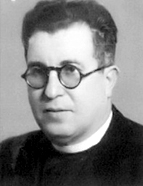

In addition to his ability to initiate and coordinate projects, Silva Rego was the author of an extensive body of historiographical work. His initial contributions to the Boletim Eclesiástico de Macau [Macau Ecclesiastical Bulletin], in the 30s, he produced over one hundred and fifty publications. At the age of 35, during the commemorations of the 200th anniversary of the foundation and restoration of Portugal, he authored his first reference work: "O padroado português do Oriente: esboço histórico" [The Portuguese patronage of the Orient: historical outline] (1940). In the 1940s, he published several other important texts such as Dialecto português em Malaca. Apontamentos para o seu estudo [Portuguese dialect in Malacca. Apontamentos para o seu estudo ] (1942), the "Sombras da Epopeia portuguesa do Oriente" [Shadows of the Portuguese Epic of the Orient] (1945) and A presença de Portugal em Macau [Portugal's presence in Macau] (1946). It was precisely during this period, while he was conducting research, that he encountered the disorganisation of the collection at the Colonial Historical Archive in Lisbon. Assuming that the condition of the latter would likely be indicative of the situation in many other archives, this sparked his desire to engage in the systematisation and preservation of both national and foreign archives (Idem, p. 150). He collaborated with and, in some instances, assisted in the establishment of African archives such as those in Luanda, Mozambique, and São Tomé, as well as Asian archives like those in Macao. He also took an active role in organising the bibliographical collections of the Geographical Society. His connection to the archival environment led to another facet related to his publications. As he himself confessed, it was his "mission" to make as much documentation as possible available and publicise it, ensuring that other researchers could conduct studies on the missionary and social actions of the Portuguese in the Orient "without leaving their lands" (A. Silva Rego, Documentação para a História... [Documentation for History] , 1947, p. VII). It was within this context that his most significant work, and perhaps his greatest legacy, came to fruition. With the support of the Agência Geral das Colónias [General Agency for the Colonies] and the Instituto da Alta Cultura [Institute of High Culture], he published, in 1947, the first of twelve volumes of the Documentação para a História das missões do Padroado Português do Oriente [Documentation for the History of the Missions of the Portuguese Patronage of the Orient] (12 volumes, 1947-1958). Following this collection, he wrote A História das Missões do Padroado português no Oriente [The History of the Portuguese Patronage Missions in the Orient] (1949), a historiographical context that aimed to be comprehensive regarding that collection of documents. However, the Herculean effort required for this ambitious project meant that the author was only able to focus on summarising the first two volumes of the Documentação.
This work is financed by national funds through FCT - Foundation for Science and Technology, I.P, in the scope of the projects UIDB/04311/2020 and UIDP/04311/2020.
